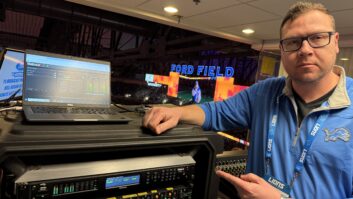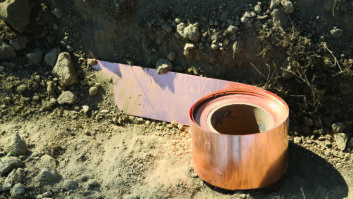KKOL(AM) in Seattle has been flagged by the FCC for what neighbors of the station describe as “blanket RF interference” near its tower site on Bainbridge Island, Wash.
The station, which branded as “1300 The Answer” with a conservative talk format, has a history of interference claims against it. The station also has frequently shifted transmitter sites and is operating from its fourth location in the past 20 years.
In the latest development, the FCC issued a Final Order this month, saying it was taking steps to protect the safety and interests of the island’s residents. The commission is granting a transfer of the station from Intelli LLC to Salem Media Group and issuing a license renewal; but only for a limited time with conditions, including a reduced power level.
The transfer marks a return of the station to Salem, which handed over ownership of KKOL to Intelli LLC in 2018 in exchange for KPAM(FM) in Troutdale, Ore. Salem then pledged to repurchase its former station in 2021. It should be noted that KKOL is licensed to Inspiration Media, Inc., which is a subsidiary of Salem.
[See Our Business and Law Page]
KKOL’s current transmitter site is located on Bainbridge Island, where it has operated on and off since 2019 after being forced to move its towers and transmitter from the waterfront in Tacoma. However, the FCC said, since that time, the 50 kW daytime station has been the subject of multiple complaints by nearby residents of blanketing RF interference disrupting all sorts of household electronics, including internet connections, cordless and cell phones, televisions, speakers, doorbells, baby monitors, HVAC controls, home electrical circuits and even invisible dog fences.
The station was dark for much of 2018 as it built out the new Bainbridge Island facility, beginning testing operations there in August of 2019. However, complaints from nearby residents began immediately, according to the FCC. The station was largely silent for the second half of 2019 and much of 2020 as owners tried to resolve interference issues.
In September of 2020 Intelli asked for Special Temporary Authority to operate KKOL at 3.2 kW, which is its maximum nighttime allowable power. The station has been testing varying power levels the past year, with FCC approval, to determine the effects on the blanketing interference.
As part of the license renewal, which was granted despite objections from the City of Bainbridge Island and some residents, Salem will operate KKOL at 35 kW daytime and will be required to conduct community outreach, responding promptly to blanketing interference complaints and remediating interference to any electronic device attributable to KKOL’s operation, including, if necessary, installing RF filters, cables, or replacement devices.
Failure of Salem to do so may result in additional enforcement measures, including, but not limited to, suspension of the station’s authority to operate, the FCC said.
While the commission said it did not consider property values and purported health effects of RF radiation in its decision making, “we are nonetheless troubled by the record evidence that KKOL’s operation has impaired local residents’ ability to work, heat or cool their homes, secure their homes, operate their cars, and communicate in the case of an emergency,” the FCC wrote in the order.
The FCC is urging Bainbridge Island residents to cooperate with KKOL’s remediation efforts, use RF filters as appropriate to protect their devices from interference, educate themselves regarding the design limitations of some electronic devices in the presence of RF noise. “And to recognize that not all technical problems are attributable to the station’s operation,” according to the order.
[Sign Up for Radio World’s SmartBrief Newsletter]
KKOL has a history of receiving interference complaints at its various transmitter and tower locations near Seattle. The station lost its longtime tower site at the Port of Seattle in 2001 due to an expansion plan, according to our previous reporting. Salem chose to build a 50 kW transmitter plant at a site near the Tacoma waterfront. But to keep the station broadcasting in the interim it built a temporary 1 kW facility using a Valcom antenna mounted on an old freighter moored in Elliot Bay.
However, during testing of the new facility in 2006 in Tacoma, one of the new site’s neighbors, U.S. Oil & Refining Co., filed a Petition for Reconsideration asking the FCC to rescind KKOL’s license. It cited safety concerns over RF at its offloading facility, about a half mile away, which could draw arcs as crews unloaded crude oil from tanker ships. It also claimed RF was interfering with sensors at the refinery and its phone systems.
A settlement agreement between the parties, approved by the commission in 2011, provided KKOL would operate from a directional antenna.
The directional antenna, however, proved insufficient to fully eliminate the blanketing interference, according to the FCC. Salem subsequently lost its Port of Tacoma lease in 2017.
KKOL’s shortened license renewal to operate at 35 kW daytime at Bainbridge Island — which has an area of 65 square miles and is located across Puget Sound from Seattle — expires in November 2026.






